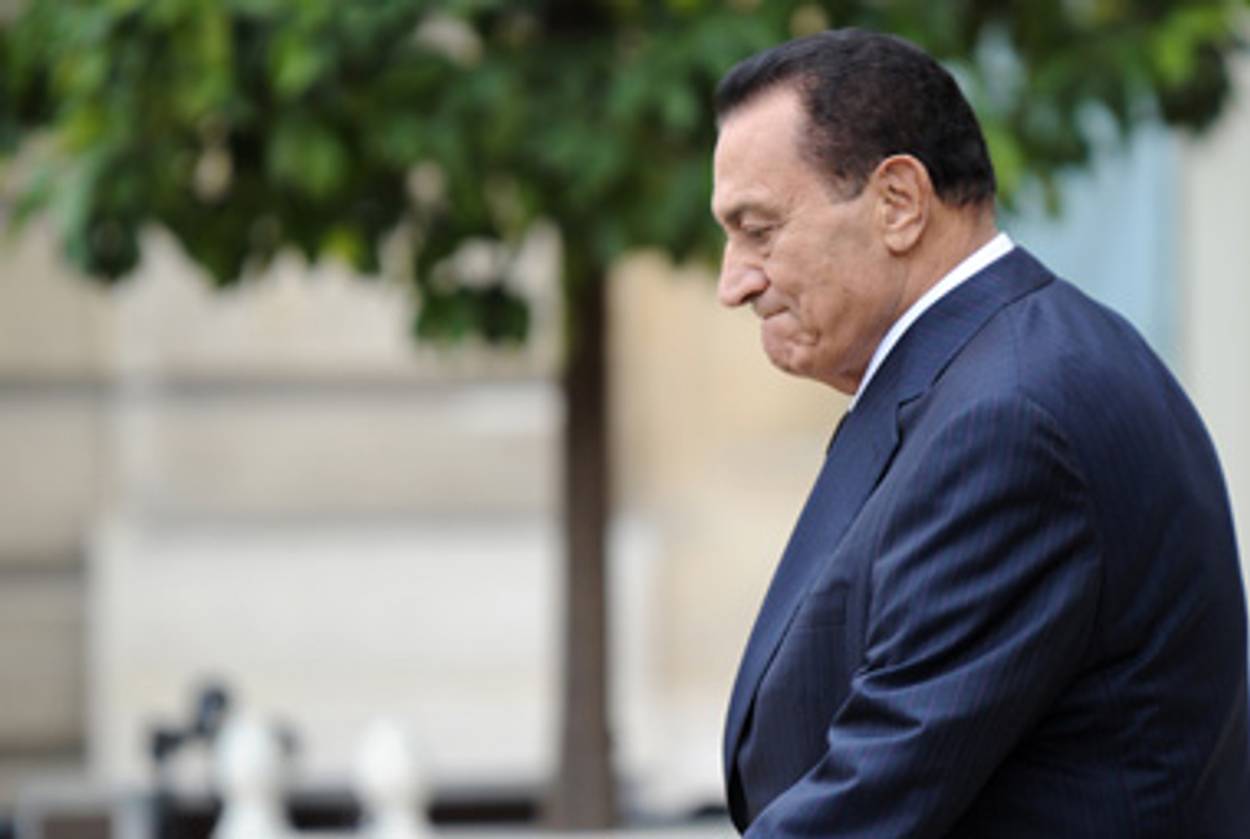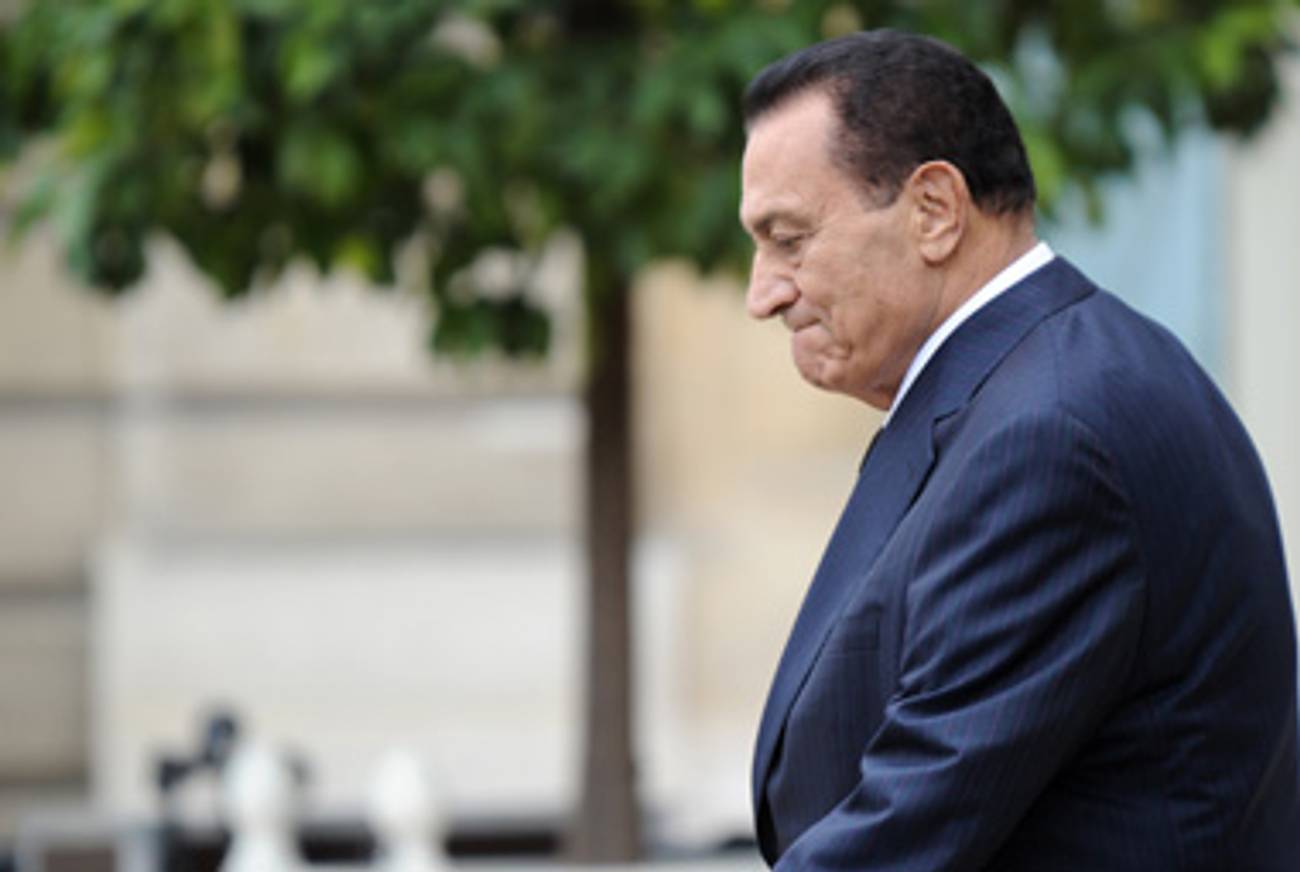Mubarak, Alone
While Israeli officials stay silent on Egypt, a former ambassador to Cairo tells Tablet Magazine about the embattled president he once knew and respected




Eli Shaked has followed Egyptian affairs from either Jerusalem or Cairo for the last 40 years. He was Israel’s ambassador to Egypt from 2003 to 2005 and the deputy ambassador from 1983 to 1992, and he first joined the Egypt desk of the Israeli Ministry of Foreign Affairs in 1974. Now retired, Shaked spoke to Tablet Magazine in a telephone interview.
What is Mubarak like?
I don’t know him as a father, grandfather, or husband. But Mubarak the president—this is the man I knew. Mubarak the president, at end of day, for all the time, was a man who radiated a heavy atmosphere, let’s say a tiredness. He creates a certain kind of atmosphere of slowly, slowly, shwayeh shwayeh [Arabic for slow]. He doesn’t speak fast. In all the years I had the chance to sit and hear him, I never once heard him have an original idea, an initiative to offer to advance any issue, be it in the Israeli-Egyptian relationship, or relations with the Palestinians or with the Arab world. He used to repeat slogans.
You told me he has a good sense of humor.
He liked more to hear jokes. He has a rolling laugh. He likes political jokes. All in all, in this aspect, he is a typical Egyptian. He is wide, a bit round. He’s a general, in short. He has the steps and posture and confidence of a general. But I didn’t get the impression that he is the man who can bring to Egypt something like a vision of a rosy future or solutions to the problems of the economy and society. I called him the major general of the status quo. He got some sort of inheritance from President Sadat, and after 30 years he didn’t change a thing.
What are his virtues?
He was loyal to his people, the people around him. Except for one instance: I remember that someone close to him said some unnecessary word and it got out in the press, something that was harmful to the president, and he was sacked. But the people around him, he was responsive to them. He was loyal to them. He wouldn’t kick people, you know, day in day out. He retained people, he knew how to keep them together as a staff.
How did he do it?
I think it’s his military background. He is a team person. Don’t forget, he wasn’t just a military man. He was the commander of the Egyptian Air Force in the Yom Kippur War. I am emphasizing this not because of the Yom Kippur War but because of the Air Force. He’s not just a general like in the artillery or Golani or even tanks, who could have just a high school education. No. A commander in the air force is a person who is educated in university and afterward in a military academy. In his time it was in the Soviet Union. He knows Russian, he studied in the Soviet Union at a military academy in Moscow. Let’s put it this way, it’s a class, it’s aristocracy.
But until today I think if I have to count his achievements, in 30 years I would say he has this issue of keeping Egypt alive over 30 years—this is an achievement. Here in Israel if I would say the fact that the prime minister of Israel manages to maintain us so we can eat pita and onion and fava beans for breakfast and at night cucumber, tomato and garlic, and that this was an achievement, they would kill me. But in Egypt there are 85 million people and more than 40 percent of the population makes less than $2 a day. I point to this as an achievement of Mubarak because somehow he managed to maintain this for 30 years.
The problems that the Egyptians are complaining about—poverty, a lack of employment, corruption—were these also complaints when Mubarak first took power?
The economic problems in Egypt are antique. Very old. Egypt, we know it from the Bible with Joseph, who came to the Pharaoh and told him about seven bad years and seven good years. There are ups and downs, but mainly downs, and if you don’t prepare for the downs you are in deep trouble.
Egypt has been in grave trouble economically and socially for many years. Keeping the Egyptian nose a little bit above sea level and being able to go on breathing is an achievement. There are almost 1.3 to 1.5 million new babies born every year. This means the population growth eats all economic achievements and social achievements. There are not enough schools. The universities are in bad shape. Egypt is not self-sufficient in any kind of foodstuff. Almost everything is imported, and Egypt pays a huge amount of money, especially for flour and grain. More than 70 percent of Egyptian flour is imported, and prices are going up because of the floods in Australia.
In the bottom line, whoever will be the next president from the left or right, whether it is a Muslim or a general, there is no solution in sight for Egypt and nobody is offering any solution. Take a look at the demonstrators, the various factions, the so-called liberals, lefties, Muslims, generals, the old government, the new government—nobody is talking about any solution to bring Egypt into an economic takeoff. A takeoff is an expression that means a trend that could take years, but at least you start the takeoff with a lot of effort in order to one day be able to fly easy.
We are on the verge of replacing one dictatorship, the regime of Mubarak—which is undemocratic—with another dictatorship that will be a theocracy led by the Muslim Brotherhood. It will be much worse, as far as democracy and liberal values in Egypt are concerned, than the rule of Mubarak. No less important, it will be very hostile to the U.S., to the West, and to Israel. What’s the point of replacing one despot with another who is going to be even worse?
Has Mubarak been a good ally to Israel?
We cannot talk about being an ally. Israel and Egypt have complicated relations. They are not simple, and they are not normal. There are components of peace between the two countries. There are diplomatic relations, with embassies in Tel Aviv and Cairo. There are trade relations that have reached over $150 million a year, and there is the academic center in Cairo for Israeli studies and Hebrew studies. There are very good relations on the level of the armies. The two armies have very good channels of dialogue. Whenever there is a problem, they get on the phone, they solve the problems, and they are very efficient on the military level. And many Israelis travel to Egypt as tourists.
What about Mubarak the man? Do you feel like at official meetings he would treat you differently because you were Israeli?
No, with Mubarak there was no problem. Whenever an Israeli official guest, a minister, came on an official visit to Egypt, he was accepted immediately by President Mubarak. Mubarak would see him, even if he was the minister of trade, or a minister from the Shas party.
We used to sit, two people from our side, and the same from the Egyptian side, the president of Egypt leading his small delegation, and the Israeli guest, I as ambassador was on his right. We used to sit and talk and discuss even when there were some tough issues. It was always polite. There was not any anger expressed or anything confrontational or insulting. It was very elegant, very gentlemanly.
And was he warm in these meetings?
There was nothing special on a personal basis. He wanted to listen to his guests’ ideas about the Middle East, about the Israelis and Palestinians. He would inquire of each Israeli minister—from the Labor party, from the Likud, from Shas, and later of course from Kadima—he would inquire about the position of each party regarding the Palestinian issue, the Syrians. He was very curious. He wanted to know, to understand the Israeli political map.
Do you think he did understand it?
I believe so. He wanted to know. Not only did he know that his guest was from a certain party with a particular position, but he knew also that within one party there could be various opinions.
What did the meeting room look like in the presidential palace?
This is a palace from days of the kings in Egypt. Huge, all marble, very elegant and very impressive. There were so many rooms and halls and reception halls. So many. And offices, and chambers and each was done in an oriental decoration style. But very elegant.
What about his house?
His house is not far from the presidential palace, in Heliopolis. It is a private villa. It’s modern, but relatively modest, there was nothing to write about, to report about. It was nice but not something extraordinary. I have seen in Egypt nicer villas that belong to the rich people. From this point of view, he wasn’t part of the nouveau riche.
Is he in touch with the poor?
I cannot tell you. If I had to think about why all this came now, this explosion, one of the reasons for this uprising is that he was disconnected from the people. He didn’t listen to their wishes. For example the fact that the Egyptian in the street did not want, and was very much against, the idea of his son succeeding him. For five or six years, I was following this fiasco of Mubarak preparing his son for the presidency. The people spoke carefully, but I could get their rejection of the idea that Egypt is like Syria and that a son can succeed his father in a republic. And they said in so many words: “We are not Syria.”
How do you feel toward Mubarak now?
I really pity him. It’s pathetic what’s happening, and I’m sorry. The man is very sick, and I really would not want what happened to the president of Tunisia to happen to him. I would want him to get up and abdicate in an elegant way. I don’t want him to be chased out of Egypt, or that people should do something bad to hurt him. He is already badly, badly hurt. He feels betrayed. The man, for 50 years and more, served the Egyptian people and all of the sudden the Egyptian people are tearing him to pieces.
At any rate, it’s pathetic and I pity him. But he’s either stubborn or stupid, and it’s impossible to convince him what to do. And there is also the problem of to whom do you pass the government, what do you do? How do you assure that the leadership will be passed in an orderly fashion? Let’s say to another general? Even among all the millions who are going wild there, they don’t have a leader who will replace Mubarak tomorrow morning.
Who do you think he is turning to?
I don’t know. I think he is sitting there in the palace, and consulting of course. I am not sure he is sleeping at night. He is closed up. The two times he gave a speech it was from the palace. I remember that hall for press conferences he used to hold. He has twice addressed the people in the last few days, and in those two times he didn’t leave the palace. He was in the presidential palace. I know the room.
Daniella Cheslow is an American journalist covering the Middle East.
Daniella Cheslow is an American journalist covering the Middle East.